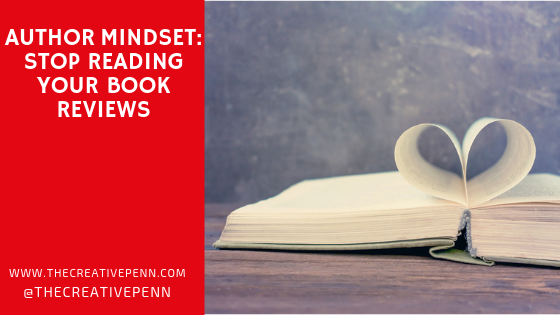There’s a moment when your book goes out into the world and you realize that someone who doesn’t love you will read it. What if they hate it? You will be crushed. What if they love it? You’ll be ecstatic until someone else hates it  This is why I (Joanna) don’t read my reviews. I even have my assistant pull out the good ones for website copy. In today’s article, Sam Hooker discusses why this may be a healthy attitude to have.
This is why I (Joanna) don’t read my reviews. I even have my assistant pull out the good ones for website copy. In today’s article, Sam Hooker discusses why this may be a healthy attitude to have.
 Once your book has made its way past the editor, the typesetter, the cover artist, and perhaps your publisher and/or publicist, it goes out into the world. Then something wonderful happens: people read it.
Once your book has made its way past the editor, the typesetter, the cover artist, and perhaps your publisher and/or publicist, it goes out into the world. Then something wonderful happens: people read it.
Then something nerve-wracking happens: people review it.
It makes sense that you would want to pay attention to your reviews. They play a crucial role in the success of your book, and they’re a quick source of anonymous feedback about your writing. But the most sensible thing may be to ignore them altogether.
1. Opinions are subjective.
When readers open your book, they read it through the lens of their world view. Everything they’ve experienced in their life has contributed to the way they see and understand what happens around them.
No two people are alike, and many people will be vastly different from you. That means readers won’t always understand your writing as you’d intended, and that can lead to some unanticipated results.
 Let’s say your reader’s favorite thing in the world is cartoons about giant robots. She may give your book 2 stars because she liked it, but she thought it would have more robot fights in space (even if you don’t write science fiction). Another may give it 1 star because it wasn’t Treasure Island, and that’s the only book he’s ever really liked.
Let’s say your reader’s favorite thing in the world is cartoons about giant robots. She may give your book 2 stars because she liked it, but she thought it would have more robot fights in space (even if you don’t write science fiction). Another may give it 1 star because it wasn’t Treasure Island, and that’s the only book he’s ever really liked.
Remember: A review will often say more about the reader than the book.
Furthermore, there’s no consistency among reviewers. Even the way that people assign stars to books can have huge variations.
You may get a 5-star review that says your book was “pretty good.” The next one may be a 2-star review calling it “the best thing I’ve ever read.”
Reviewers may give 5 stars to every book they like, or swear that they’ll only bestow that honor once in their life. This inconsistency is never going to change, so save yourself the frustration of trying to make sense of it.
Remember: There’s no right or wrong way to express an opinion.
2. They aren’t your reviews.
Always keep in mind that readers are reviewing your work, not you as a person. It’s often hard to separate the two, especially when a reviewer writes something negative about the author.
Here’s the thing: reviewers don’t know you. At best, they know your book – assuming they bothered to read the whole thing, which people won’t always do if they dislike a book. Reviewers often conflate authors with their books, but authors don’t have to make the same mistake.
Remember: A review is a stranger’s opinion of your book, not the truth about you.
3. Reviews are not a good source of validation or critique.
Reading reviews may seem like the surest way to know whether people liked your work. They come with 1-5 stars, and their average gives you a number grade for your work, right?
 Don’t fall for it. First of all, you didn’t take a test, you wrote a book. There is no rubric for grading a book. Reviews are opinions, not truths.
Don’t fall for it. First of all, you didn’t take a test, you wrote a book. There is no rubric for grading a book. Reviews are opinions, not truths.
Second, readers are just people. Very few of them have formal training in expressing literary opinions. Even if they do, professionals who write reviews for industry publications are still doing what everyone else is doing: expressing an opinion.
Feedback is important to your growth as an author, but you need to get it from the right place. Author critique groups are a great source of targeted feedback, especially if you can find one that focuses on your subject or genre.
Remember: Good feedback comes from trustworthy sources, not the opinions of anonymous strangers.
4. The best reviews don’t come with 5 stars. Seriously.
It’s a great feeling when your book gets 5-star reviews. They boost your confidence and they balance out the inevitable 1-star reviews (which you would see if you were tracking your average, which you aren’t).
But to readers, 5-star reviews can seem suspicious. A review that glows too brightly may be dismissed as having been written by your parents.
Here’s a bit of good news: most readers who are suspicious of 5-star reviews will dismiss 1-star reviews as well, especially when they say nothing more than “don’t waste your time,” or “blah, it sucked.” They understand that reviews are just opinions, and not all of them matter.
Readers who seriously consider reviews when shopping for books are likely to view 2-, 3-, and 4-star reviews with more credibility. If the text of a 3-star review is genuinely complimentary, it may win you a reader – or at least a sale!
Remember: Mid-ranked reviews give your book credibility.
5. You don’t get to respond. Never, ever, ever respond.
You’ve probably heard the adage, “don’t start a fight you can’t win.” Every book review is a professional boxer on steroids with brass knuckles under their gloves.
 It would feel so good to tell 1-star reviewers off, wouldn’t it? Especially the ones who “don’t usually read this sort of thing.” So, why did they pick your book to start? If it “just wasn’t their taste,” why not not review it?
It would feel so good to tell 1-star reviewers off, wouldn’t it? Especially the ones who “don’t usually read this sort of thing.” So, why did they pick your book to start? If it “just wasn’t their taste,” why not not review it?
Here’s the problem: you can’t stop a reviewer from posting their opinion, and you can’t prove an opinion wrong. The fact is that they didn’t like your book, and there’s no way to respond that won’t come off as petty or insecure.
Telling off a reader may even make you look like a bully, and that’s not the sort of reputation you want.
As frustrating as it is, your only option is the high road. You don’t get to defend yourself. That doesn’t mean you don’t get to complain! You just don’t get to complain to your readers. If you need to vent about bad feedback, consider asking your critique group to meet you at the bar. They’ll have their own bad reviews to share, I promise.
Remember: You won’t be tempted to respond to anonymous opinions if you haven’t read them.
The key is finding your readers.
The most important factor to your book’s success–and to your success as an author–is connecting with your audience. The people who are going to like your work are already out there. You’re not going to change the minds of anyone else because you can’t prove their opinions wrong.
The best way to ensure good reviews is to find your readers and connect with them. You don’t want to connect with all readers, just your readers. Their reviews are the ones that count, and you know that they’ll be good–so why spend time reading them?
Do you read your book reviews? Please leave your thoughts below and join the conversation.
 Sam Hooker is a darkly humorous fantasy novelist. Learn more about his Terribly Serious Darkness series and other works at his website or follow him on Twitter.
Sam Hooker is a darkly humorous fantasy novelist. Learn more about his Terribly Serious Darkness series and other works at his website or follow him on Twitter.
